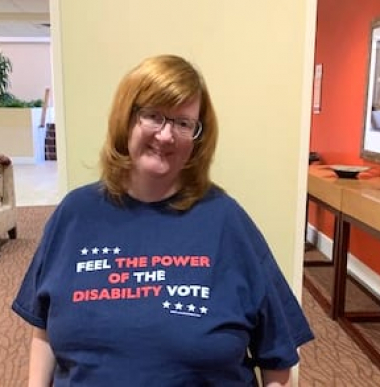In this video, Diana Mairose, who has Noonan’s syndrome as well as learning and developmental disabilities, shares her experience in working as a poll worker and discusses why being involved is important to her. Diana discusses how becoming a poll worker allowed her to become a more informed citizen and more familiar with the electoral process:
“I became a poll worker so I could understand what other people with disabilities were going through on election day.”
“I think the most political issue for me, right now, is to not have the marriage penalty, which means that people with social security get one check instead of two,” Diana continues. The marriage penalty impacts people with disabilities like Diana who want to get married. When individuals who receive Supplemental Security Income (SSI) marry another individual who also receives SSI, their benefits can be capped at a lower rate than they are for unmarried individuals. They can also lose their Medicaid coverage. As a result of this unfair practice, individuals with disabilities are disincentivized from obtaining a legal marriage.
She ends by encouraging other people with disabilities to join her in becoming a poll worker:
“I think we do need a lot more people with disabilities to become poll workers – because technology is different, voting is different, and places in the community are different.”
Poll workers will be essential to ensuring that we are able to vote safely and securely this November. They also provide the much-needed service of setting up accessible voting machines, to ensure that people with disabilities are able to vote in person. As we face a poll worker shorter for the fall, now more than ever it is important for people to sign up to be a poll worker.
To become a poll worker like Diana, you can sign up on the Power the Polls website.

